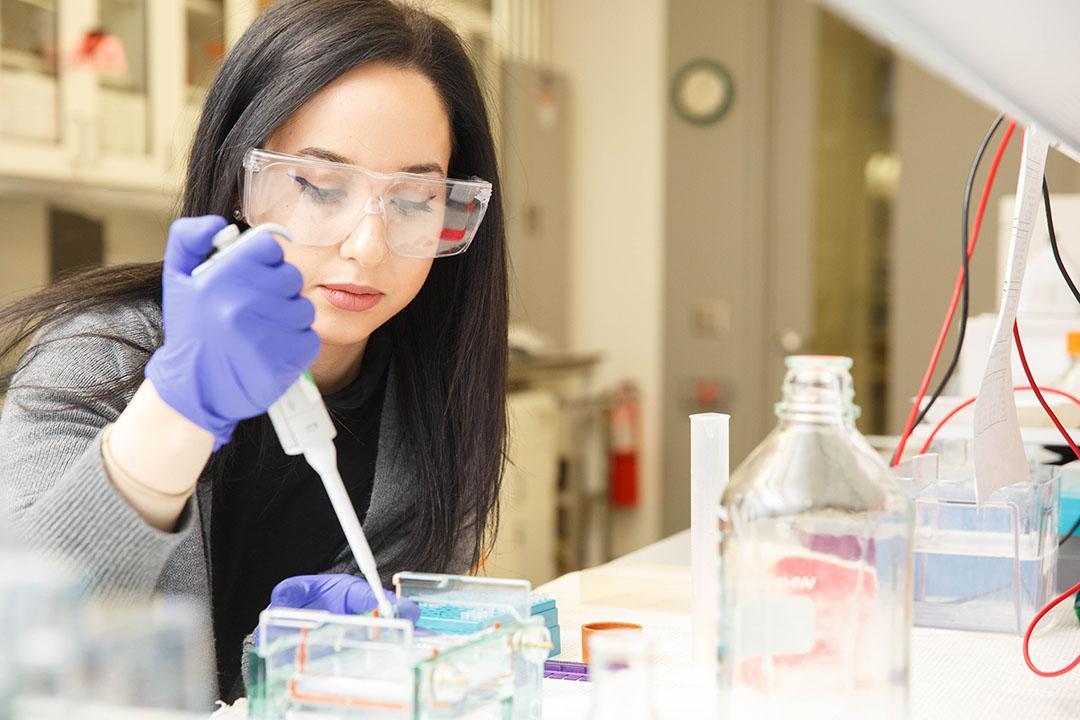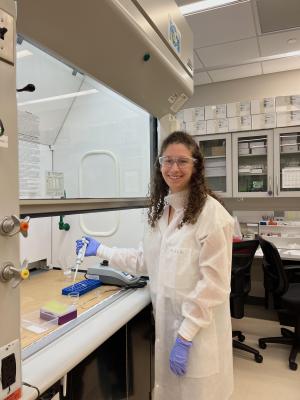Undergraduate Research
Research brings students into contact with a variety of chemical literature, fosters a spirit of independence and inquiry, builds familiarity with complex instruments and technologies and helps develop sound judgment. Many students make connections in the lab that turn into professional opportunities and careers down the road.
Students majoring in American Chemical Society (ACS)-certified degrees must complete a minimum research requirement, but we strongly encourage all undergraduates to pursue lab opportunities as early as first year.
Interested in Undergraduate Chemistry Research? There's a Course for That!
Learn about cutting-edge chemistry research at GW and get started with research! CHEM 2199: Frontiers of Chemical Research is a 1.0 credit hour seminar course that will introduce you to current research in the Chemistry Department. Each week, a different chemistry faculty member will present their research and answer questions. Toward the end of the semester, you will select a professor to engage with further to learn more about their research program and to shadow a researcher in their lab.
Offered in fall semesters. Prerequisite: CHEM 1112 or consent of the instructor. jmeisel![]() gwu [dot] edu (Contact Professor Meisel) for more information.
gwu [dot] edu (Contact Professor Meisel) for more information.
"This fellowship allows me to continue my research regarding the development of a gas chromatography-mass spectrometry selected ion monitoring method to separate and detect nitazene analogs in drug residues from syringe samples. Nitazenes are a novel class of synthetic opioids that are more potent than fentanyl and have started showing up in the DC area."
Alexa Mehlman
Madeleine Reines Jacobs Fellowship Recipient 2023
The GWU Chemistry curriculum prepared me very well by equipping me with necessary problem-solving and critical-thinking skills for my future endeavors..
Rachel M. Taylor, DMD
GW BS Chemistry '18
How Research Benefits You
As an undergraduate researcher, you will work side by side with graduate students and faculty in our light-filled modern labs.
Interdisciplinary Options
- Analytical chemistry
- Biological chemistry
- Environmental chemistry
- Inorganic chemistry
- Organic chemistry
- Physical chemistry
- Theoretical chemistry
Future Career Opportunities
- Graduate school
- Professional schools (health)
- Pharmaceutical R&D
- Chemical manufacturing industry
- Public service & nonprofit
- Business & entrepreneurship
- Communication & journalism
Get Involved
- Talk to your faculty advisor or appropriate graduate students about your research interests and the potential openings, projects and requirements. Laying the groundwork early will ensure a good fit.
- Explore the website or our department newsletter to learn about the research projects faculty members are currently engaged in.
- Talk to fellow undergraduates who are doing research to get a feel for what your day-to-day experience will be like in a research lab.
- Sign up to perform research as a volunteer or intern.
- Find a paid position with a faculty member.
- Enroll in research for credit (CHEM 4195 or 4195W) — required for majors pursuing ACS-certified degrees in chemistry or biochemistry.
- Apply for a summer research program as a rising junior or senior. Students earn a stipend to work under the chemistry faculty member of their choice.
For further guidance, contact your advisor or a member of our staff.
Research Course Requirements
An undergraduate research course, CHEM 4195 or 4195W, is required for certain majors. We recommend that students take the course for at least three credits over two semesters. The first semester (one credit) provides a transition into the research group and introduction to the methodology. In the second semester (two credits) students dive deeper into the project. The more time (and credits) spent on the research, the more useful the data will be.
The course culminates with a paper describing the methods and results of the project. The final paper should be a well written, comprehensive and properly documented report, regardless of the success of the research. Students are expected to deliver a final paper presentation.





